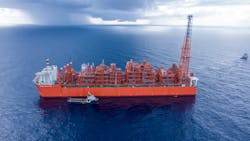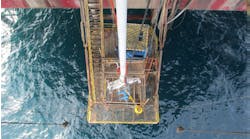Offshore staff
MILAN, Italy — The Coral South Project has safely achieved the introduction of hydrocarbons to the Coral Sul FLNG plant from the Coral South reservoir offshore Mozambique, according to a recent Eni news release.
Eni serves as upstream delegated operator of Area 4 on behalf of its partners Exxon Mobil, CNPC, GALP, KOGAS and ENH.
Following the introduction of gas in the plant, Coral Sul FLNG will now be ready to achieve its first LNG cargo in the second half of 2022, adding Mozambique to the LNG-producing countries.
Hydrocarbons introduction comes after the safe and timely conclusion of the offshore commissioning activities. The FLNG arrived at the final operating site offshore Mozambique in early January 2022; mooring and connection to six underwater production wells were finalized in March and May 2022, respectively.
The Coral South project achieved final investment decision in 2017. FLNG fabrication and construction activities started in September 2018 (hull first steel cut) and were completed in 38 months as planned, despite the COVID-19 pandemic, with a FLNG sailaway, from South Korea to Mozambique on November 2021.
While performing the construction activities in Korea, several significant activities were undertaken in Mozambique, with support from the Mozambican authorities, including the ultradeep waters (2,000m water depth) drilling and completion and offshore installation campaign that involved the highest technological and operational skills.
Coral Sul FLNG has been implemented with an energy optimization approach, integrated in the design via a systematic analysis of energy efficiency improvements, the release stated. These include among others, zero flaring during normal operations, use of thermal efficient aero-derivative gas turbines for refrigerant compressors and generation, use of Dry Low NOx technology to reduce NOx emission and waste heat recovery systems for the process.



